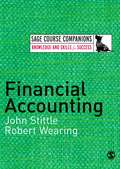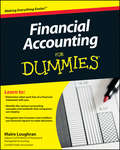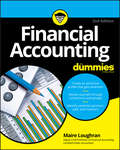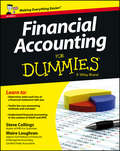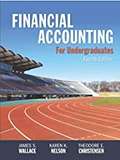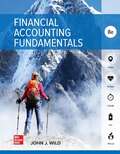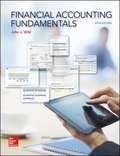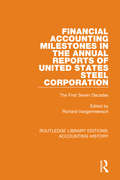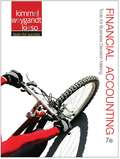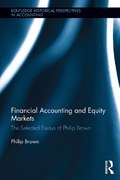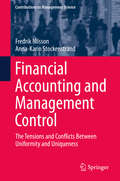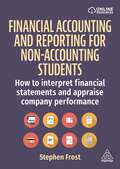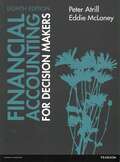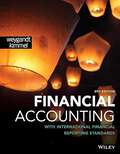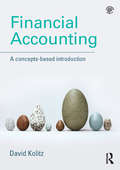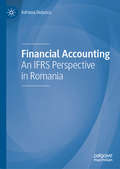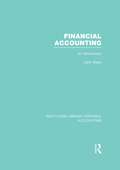- Table View
- List View
Financial Accounting (SAGE Course Companions series)
by Robert T Wearing Mr John StittleThe SAGE Course Companion on Financial Accounting is an accessible introduction to the subject that will help readers to master key concepts and enhance their thinking skills in line with course requirements. It provides support on how to revise for exams and prepare for and write assessed pieces. Designed to compliment existing textbooks for the course, the companion provides: - Easy access to the key issues in Financial Accouting - Practice questions and sample answers to help you prepare for exams and assignments - Tips to help you remember key points and earn extra marks - Helpful summaries of the approach taken by the main course textbooks - Guidance on the essential study skills required to pass the course The SAGE Course Companion on Financial Accounting is much more than a revision guide for undergraduates; it is an essential tool that will help readers take their course understanding to new levels and help them achieve success in their undergraduate course.
Financial Accounting For Decision Makers
by Mark DeFondThis is an ideal text for use in the first financial accounting course at both the undergraduate and the graduate level. With a strong emphasis on the interpretation of real-world financial statements, the book teaches students how to read, analyze, and interpret financial accounting data to make informed business decisions without using the traditional debit/credit paradigm. The book is filled with examples that use financial reports from actual companies, an approach that students find engaging. The objective of this text is to prepare students for careers in business by providing them with a solid foundation in financial accounting and reporting without overloading them with the mechanics and procedures more appropriate for future accountants. This book makes extensive use of real-world companies to help students understand how to use accounting information.
Financial Accounting For Dummies
by Maire LoughranYour plain-English guide to navigating a financial accounting courseDespite the economic landscape and job market, demand for accountants remains strong, and accountants will continue to see high demand for their services as the economy rebounds and businesses grow. Additionally, one of the effects of the economic downturn is a greater emphasis on accountability, transparency, and controls in financial reporting.With easy-to-understand explanations and real-life examples, Financial Accounting For Dummies provides students who are studying business, finance, and accounting with the basic concepts, terminology, and methods to interpret, analyze, and evaluate actual corporate financial statements.Covers traditional introductory financial accounting course materialExplores concepts accountants and other business professionals use to prepare reports Details mergers and acquisitions purchase and pooling, free cash flow, and financial statement analysisWhether you're a student on your way to earning a bachelor's degree, MBA, or MAcc, Financial Accounting For Dummies gives you a wealth of information to grasp the subject and ace the course.
Financial Accounting For Dummies
by Maire LoughranLearn to speak fluent finance—and ace your exams! Warren Buffett said that “accounting is the language of business.’’ And for many accounting and business students, the obscure terminology of finance makes fluency hard to achieve. Financial Accounting For Dummies can help to demystify abstract concepts in a straightforward, friendly way. With step-by-step examples and real-world scenarios practice, it helps you grasp the fundamentals of finance until you’re ready to interpret, analyze, and evaluate corporate financial statements like you’ve been doing it all your life. Packed with easy-to-understand examples, this book takes you from the big three financial statements all the way through to income taxes. Or join the anti-fraud squad by discovering how to spot the ten most common accounting shenanigans. Grasp introductory financial accounting course material Explore common concepts financial professionals use to compile reports Understand mergers and acquisitions, free cash flow, and statement analysis Know the ten industries with special accounting standards Whether you’re studying for your bachelor’s, MBA, or MAcc, you’ll find everything you need to speak the language of finance like a native—and use it to get to wherever you want to go!
Financial Accounting For Dummies - UK
by Maire Loughran Steven CollingsYour plain–English guide to financial accounting for students and trainees. Financial Accounting For Dummies provides students who are studying finance, accounting and business with the basic concepts, terminology, and methods to interpret, analyse, prepare and evaluate financial statements. Covers concepts accountants and other business professionals use to prepare reports; mergers and acquisitions purchase and pooling; free cash flow; and financial statement analysis. Whether you′re a student on your way to earning a degree, working towards your ACCA qualification, or a trainee just starting out in your accounts career, Financial Accounting For Dummies gives you a wealth of information to grasp the subject. This UK version is adapted to take in UK accounting practice and international reporting standards Provides a firm grounding in interpreting, analysing, preparing and evaluating corporate financial statements Includes easy–to–understand explanations and real-life examples to consolidate learning
Financial Accounting For Undergraduates
by James Wallace Theodore Christensen Karen NelsonFinancial Accounting for Undergraduates textbook.
Financial Accounting Fundamentals
by John J. WildFinancial Accounting Fundamentals responds to the market's request for a succinct book; a book that balances large and small businesses, and one that is contemporary, engaging, and accessible for today's students. With content that is presented in organized learning blocks ending with a need-to-know examples, the text makes it easy for students to find the most relevant content needed to solve problems. Chapter opening vignettes use dynamic, well-known entrepreneurs to appeal to all students and show the relevance of accounting. Students are encouraged to think like a businessperson and apply what they learn. A wide variety of assignments provide instructors with flexibility to teach, assess, and challenge students on several levels. Join your colleagues and the millions of students that have used this best-selling learning system to advance their education and careers.
Financial Accounting Fundamentals (Fifth Edition)
by John J. WildEnhancements in technology have changed how we live and learn. Working with learning resources across devices,whether smartphones, tablets, or laptop computers,empowers students to drive their own learning by putting increasingly intelligent technology into their hands.Whether the goal is to become an accountant, a businessperson,or simply an informed consumer of accounting information, Financial Accounting Fundamentals has helped generations of students succeed. Its leading edge accounting content, paired with state-of-the-art technology, supports student learning and elevates understanding of key accounting principles. Financial Accounting Fundamentals also delivers innovative technology to help student performance. Connect Accounting provides students with a media-rich eBook version of the textbook and offers instant grading and feedback for assignments that are completed online. Our system for completing exercise and problem material takes accounting content to the next level, delivering assessment material in a more intuitive, less restrictive format that adapts to the needs of today’s students.
Financial Accounting Information for Decisions (Sixth Edition)
by John J. WildA book after the student's own success in financial accounting (FA) course. Systematically collated, with clear and pertinent reading materials; aiming at effective and efficient learning to meet the tech-savvy students and as it brings accounting to life.
Financial Accounting Milestones in the Annual Reports of United States Steel Corporation: The First Seven Decades (Routledge Library Editions: Accounting History #24)
by Richard VangermeerschThis book, first published in 1986, examines extracts sections from the annual reports of United States Steel Corporation over the period 1902-1968. These extracts are milestones in the history of financial reporting in the United States, and the documents are presented as they originally appeared. They capture many historical events and the company management’s reaction to them.
Financial Accounting Reading: Assets (International And Comparative Criminal Law Ser.)
by Dennis CampbellThis reading provides a complete overview of assets, the variety of resources owned or controlled by a business entity. Assets are an element of the accounting equation Assets = Liabilities + Equity and are reported on a company's Balance Sheet.
Financial Accounting Reading: Fair Value Measurement in Accounting
by David F. HawkinsThe objective of this reading is to enhance student understanding of the concept of fair value as used in accounting. It is not intended to expand a student's knowledge of specific accounting applications of fair value at the transaction level.
Financial Accounting Reading: Introduction to Valuation
by Paul M. HealyThe objective of this reading is to introduce students to two fundamental investment principles that underlie stock valuations and how these principles apply to two popular approaches to valuing stocks: multiples and discounted future earnings.
Financial Accounting Reading: Market and Regulatory Institutions
by V. G. NarayananThis reading covers the various market and regulatory institutions involved in the accounting rulemaking process in the United States and beyond.
Financial Accounting Reading: Revenue Recognition
by David F. HawkinsThe overarching goal of the revenue recognition chapter is to help students understand better the substance and implementation challenges of the joint FASB/IASB revenue recognition standard.
Financial Accounting Tools for Business Decision Making 7e
by Donald E. Kieso Jerry J. Weygandt Paul D. KimmelWritten in a concise, clear, and conversation way, Kimmel Financial Accounting provides just the right amount of information students need to come to class prepared. Starting with the big picture of financial statements first, Paul Kimmel shows students why financial accounting is important to their everyday lives, business majors, and future careers. This best-selling financial accounting text is known for the most relevant and easy to understand examples, while teaching students the accounting cycle through the lens of one consistent story of Sierra Corp, an outdoor adventure company.
Financial Accounting and Equity Markets: Selected Essays of Philip Brown (Routledge Historical Perspectives in Accounting #4)
by Philip BrownPhilip Brown is one of the most admired and respected accounting academics alive today. He was a pioneer in capital markets research in accounting, and his 1968 article, co-authored with Ray Ball, "An Empirical Evaluation of Accounting Income Numbers," arguably had a greater impact on the course of accounting research, directly and indirectly, than any other article during the second half of the twentieth century. Since that time, his innovative research has focused on issues that bridge accounting and finance, including the relationships between net profit reports and the stock market, the long-run performance of acquiring firms, statutory sanctions and voluntary corporate disclosure, and the politics and future of national accounting standards to name a few. This volume brings together the greatest hits of Brown’s career, including several articles that were published in out-of-the-way places, for easier use by students and researchers in the field. With a foreword written by Stephen A. Zeff, and an introduction that discusses the evolution of Brown’s research interests and explains the context for each of the essays included in the volume, this book offers the reader a unique look inside this remarkable 50-year career.
Financial Accounting and Management Control
by Fredrik Nilsson Anna-Karin StockenstrandThis book is about financial accounting and management control and how these two information systems are related as well as how their objectives conflict. At the most fundamental level, the objective of financial accounting is to provide owners and funders with comparable information on a company's value creation. The aim of management control, on the other hand, is to give the board, senior executives and employees unique information for strategy formulation and implementation. One often-mentioned negative effect is the risk of financial accounting affecting management control design and use, making it less relevant for decision-making at the company level. The book provides an analysis of the complex relationship between financial accounting and management control. The analysis is based on theoretical reasoning as well as several examples of how financial accounting standards affect not only the annual report but also the control system. An interesting, and perhaps unexpected conclusion is that management control seems to affect financial accounting almost as much as financial accounting affects management control. These complex relationships, which can influence the design and use of both financial accounting and management control, are discussed in detail in this book.
Financial Accounting and Reporting for Non-Accounting Students: How to Interpret Financial Statements and Appraise Company Performance
by Stephen FrostThis textbook introduces the essential principles of financial accounting to non-accounting students, written for an international audience with global case studies and a suite of learning features.Using terminology which is compliant with International Financial Reporting Standards (IFRS), Financial Accounting and Reporting for Non-Accounting Students covers topics such as the statement of financial position, profit and loss statements, non-current assets, inventory valuation and the statement of cashflows. It also provides a roadmap for performance appraisal and presents the subjective nature of financial accounting and the impact of bias in financial reporting.Real-world case studies from Huawei, Ryanair and Greggs illustrate the principles discussed in the book and a fictional performance appraisal case study demonstrates how financial metrics can be applied to analyse the effects of new entrants on an incumbent's operating performance. With over 300 multiple-choice questions, 44 extended problems and more than 90 questions to enable deep learning in the fundamental aspects of this core business subject, Financial Accounting and Reporting for Non-Accountings Students is a key textbook for undergraduate and postgraduate students taking modules on financial accounting and reporting or introductory modules in accounting.
Financial Accounting for Decision Makers
by Mark DeFondWith a comprehensive and accessible introduction to the subject, Financial Accounting for Decision Makers focuses on the ways in which financial statements and information can be used to improve the quality of decision making. The practical emphasis throughout the book ensures the material is always relevant, whilst the authors’ style of introducing topics gradually and explaining technical terminology in a clear, friendly style caters for all students, whether on specialist accounting or non-specialist business degrees.
Financial Accounting for Undergraduates (3rd Edition)
by James Wallace Karen Nelson Ted Christensen Ken FerrisWelcome to the Third Edition of Financial Accounting for Undergraduates. We wrote this book to satisfy the needs of students taking their first financial accounting course by providing a high quality, contemporary, and engaging textbook at an affordable price. Financial Accounting for Undergraduates is written for students who want to understand how financial statements are prepared and how the information in published financial reports is used. The Third Edition has benefited from extensive feedback from adopters of the first two editions and suggestions from focus groups, market surveys, manuscript reviews, and interviews with faculty from across the country.
Financial Accounting with International Financial Reporting Standards
by Jerry J. Weygandt Paul D. KimmelAn essential and intuitive treatment of financial accounting with an international perspective <p><p>The use of International Financial Reporting Standards is growing rapidly, both outside of the United States and within, especially as IFRS incorporates more US GAAP rules. In the newly updated fifth edition of Financial Accounting with International Financial Reporting Standards, a team of accomplished financial practitioners and educators delivers the newest version of their highly anticipated text. This important work offers practical end-of-chapter exercises and practice problems complete with foreign currency examples, as well as an emphasis on non-US companies and examples. It is perfect for accounting students seeking exposure to internationally utilized accounting standards.
Financial Accounting: A Concepts-Based Introduction
by David KolitzFinancial accounting is the branch of accounting thought and practice concerned with preparing and providing information for external users of financial statements. This textbook helps students to understand the concepts that underpin the application of accounting theory to solve accounting problems. This international edition includes extracts from financial statements, definitions of key terms and exam examples. Unlike other textbooks, the author provides analysis of why accountants do what they do, and not just how. With such a wealth of accounting models and diagrams intertwined with this analysis, this book guides the reader through all the practicalities and concepts of financial accounting. Additional online questions, exercises and problems provide an opportunity to put this new-found knowledge into practice along the way. This book is an essential guide for students new to accountancy, and an equally useful tool for more experienced students and researchers.
Financial Accounting: An IFRS Perspective in Romania
by Adriana DuțescuThis book covers the principles, concepts, techniques and practical tools of financial accounting in supporting overall business decisions. Using a comprehensive theoretical framework, this book is enhanced by practical examples, exercises, chapter summaries and complex cases in each of the eleven chapters. With the International Financial Reporting Standards (IFRS) and their specific Conceptual Framework as the baseline approach, this book also highlights Romanian regulation and practice specifically. Despite the globalisation efforts, this book demonstrates that there are still discrepancies and cultural challenges and will be of interest to students and academics of financial accounting.
Financial Accounting: An Introduction (Routledge Library Editions: Accounting)
by John BlakeThis book is a practical textbook for first-year students. It begins by describing the nature and environment of accounting and continues with an examination of the double entry book-keeping system. There are chapters on the principles which govern accounting practice and the presentation and interpretation of accounts. Inflation accounting is also covered as are cash budgets and funds flow.
